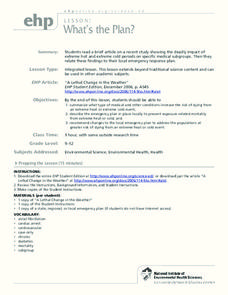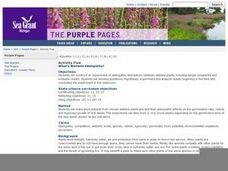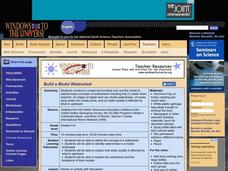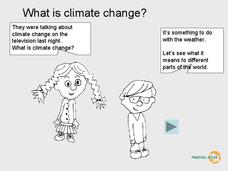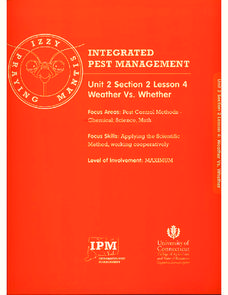Omaha Zoo
Monitoring Amphibians
What sort of shoes do frogs wear? Open toad sandals. If your scholars want experience collecting field samples, this is the lesson for you. After learning the proper way to collect field samples, pupils catch amphibians to test for...
Curated OER
Identify And Classify
In this consumer awareness activity, students learn that hazardous household products have words that identify the risk. Students view 54 photos of common household substances. Students sort them into piles according to the hazard risk.
Curated OER
Working With Environmental Issues
Students consider the source of disease and parasites in West Africa. In this environmental issues lesson plan, students read "Working with Environmental Issues," by Fred Koehler. Students participate in an activity that requires...
Curated OER
What's the Plan?
Is there a higher risk of dying on an intensely hot or incredibly cold day? Explore the effects of extreme weather on human health by reading a short article about a study done to address this question. Since the links in the lesson are...
Curated OER
Bio-What
Learners explore the concept of biodiversity. Through activities, they discover the importance of one species upon another. Students examine food webs, discuss animals interdependence upon one another, and brainstorm why biodiversity is...
Curated OER
What's Wetland Allelopathy?
Students study plants and what they need to thrive and survive. They make plant extracts from chosen wetland plants and test their allelopathic effects on the germination rate, radicle growth, and hypocotyl growth of test seeds of other...
Curated OER
What Would You Do If?
Young scholars investigate the concept of how nature needs to be conserved. They examine how man has had a positive and negative impact. Students work in teams to make up scenarios with problems and then propose environmental solutions.
Curated OER
Environmentally Friendly
What can your pupils do to promote better conditions for wildlife? After researching issues around wildlife management, class members use the Internet to locate three different organizations devoted to protecting wildlife. They then...
Curated OER
What Happens When Invasive Species Are Introduced
Helping students understand the dangers of nonnative species is an important part of ecology and environmental science lessons.
Pulitzer Center
Extractive Industries
Here is a chance for environmental studies classes to take a critical look at crises occurring around the globe by reading articles and viewing video clips. The human activities under scrutiny are the extraction of oil, logging, and...
Centers for Disease Control and Prevention
Understanding the Epidemiologic Triangle through Infectious Disease
Introduce infectious diseases and the epidemiologic triangle. A helpful resource describes the agent, host, and environment from the three vertices as well as the time factor, which is in the middle. Scholars complete a simple...
Florida Department of Environmental Protection
Water's Journey Expedition
Step into a scientist's shoes to go online and discover the Florida Springs Expedition, and participate in two activities focusing on how humans impact the environment. The first activity asks scholars to summarize the six dispatches at...
Curated OER
Disease, Environment, Health, Human Populations, and Modern Technology
What is a pandemic, epidemic, and a vaccine? What changes have occurred in health and environmental awareness with the advent of new technology? This 20 question multiple choice quiz asks kids to answer who, what, when, and where about...
Curated OER
Build a Model Watershed
Collaborative earth science groups create a working model of a watershed. Once it has been developed, you come along and introduce a change in land use, impacting the quality of water throughout their watershed. Model making is an...
Pulitzer Center
Exploring Downstream: Water Resources
The lack of clean water is a life-threatening plight for millions of people around the world. Through an extensive WebQuest, young environment or social studies classes compare our water availability to that of the cxitizens of Ethiopia,...
Curated OER
Hazards: Fifth Grade Lesson Plans and Activities
After comparing earthquake and volcanic hazards to one another, fifth graders take a closer look at damage associated with a volcanic eruption. They then create a simulation of mudslides due to a volcanic eruption. Using different...
Virginia Department of Education
Evidence of Evolution
What an impression fossils make! In this activity, aspiring paleontologists view fossils and construct a timeline to further understand how the lack of natural adaptation caused historical organisms to become extinct. While they should...
Curated OER
Pollution - What is It Doing to Us?
Students recognize some forms of pollution. In this science lesson plan, students recognize and understand some of the devastating effects of the acid rains and other possible factors that are contrary to the pH balance of nature.
Curated OER
What is Climate Change?
Students research climate change. In this environmental lesson, students view a PowerPoint slideshow about climate change and identify the ways that climate change affects life on Earth.
Curated OER
What Class Are You In?
Classifying animals has never been this much fun! Pupils discuss the animal groups, fish, reptiles, amphibians, mammals, birds, and also identify their characteristics. Then, they take pictures of animals and classify them in a group...
Curated OER
What Is That Bubblin¿¿¿ In My Back Yard?
Students create a map plotting local sites the Environmental Protection Agency has on its EPA Regulated Sites list. They discuss the need for citizens to, at a minimum, be aware of potential pollution hazards in their community.
Curated OER
What is an Aquifer?
Students examine how an aquifer operates. They discuss the implications of the groundwater becoming contaminated. They work together to create an aquifer model to observe the connection between surface water and groundwater.
Curated OER
Recognizing Litter
When does trash become litter? Use this litter awareness lesson to help them understand the importance of trash disposal. Get learners engaged by reading Nancy Loewen's Lady Lulu Liked to Litter (not included). After discussing what...
University of Connecticut
Weather Vs. Whether
Monarch butterfly populations have decreased by 90 percent over the past 20 years due to misuse and ineffectiveness of some pesticides. Given the challenge to increase pesticide safety and effectiveness, the class, through discussion,...





